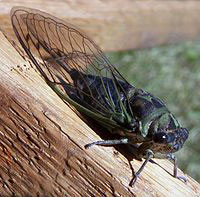The cicada’s songs so prominent these days made me think of sharing today’s guest column by Shirley Clark, who wrote this reminiscence while taking a “Telling Our Stories” class more than a decade ago and then included it in her book,
“The Clock and the Storyteller.”

Seventeen years ago, the nymphs dropped from the tree where the eggs had been laid by the female before she died. They burrowed underground and began the long evolution. Eventually they turned into big bugs that developed hard brown shells. They burrowed out of the ground and slowly crawled up a tree or fence post or the side of a building. Here the shell split and a large bug-eyed green cicada, about the size of a shrimp, appeared. It spread its large wings and allowed the warm air to dry them. Gradually, the cicadas worked their way high up into the trees.
They immediately began their song, informing others of their kind they had arrived. They are always in a hurry, because their life span is brief. In only a few short days, they must find and select a partner. They must mate, lay their eggs, and die so the cycle can begin all over.
For the short-lived period of time they are here on earth, they fill the days and nights with their song. The trees seem full of this buzzing noise. The older members of my family called them “dry flies.”
The hot summer evenings of my childhood were spent sitting out under the large pecan trees in our yard sipping homemade lemonade and being serenaded by those singing bugs. During the summer, Mother moved a bed to the screened porch. Some nights I slept on this bed and long after I was tucked in, before sleep came, I listened to the night sounds. Always the cicada’s songs dominated. Their symphony rose and fell, sometimes raising to a crescendo any orchestra would envy.
I remember those summer nights when the inky black sky seemed filled with millions of twinkling stares. I lay in bed and searched for the constellations: the big and little dipper, Taurus, the bull. Ursa, the bear, and the Milky Way. The great Dog Star, the brightest of all the stars in the night sky, is called Canis Major or Sirius after the Egyptian god Osiris. It appears and dominates the sky during the hottest part of the season, between early July and early September coinciding with the appearance and disappearance of the cicadas.
Sometimes I awoke and found the night was quiet, the cicadas were silent. The only sounds were the croaks of the big bullfrogs that lived at the pond in our pasture.
With nostalgic memories, I always welcome the arrival of those big-eyed green bugs that my husband calls “Studebaker bugs,” because to him they resemble the 1949 Studebaker automobile. When I find a dead cicada, I wonder if it had a chance to fulfill the life-cycle.
In seventeen years will its descendents emerge and fill the summer nights with their songs? I am also saddened when I observe a large red wasp that preys on the Cicadas, dragging one to its nest. I know this is just part of nature and the process of survival. However, at times I have taken the victim away from the wasp and buried it, often stomping the predator in the process. After all, I have never been stung by a cicada.
So nowadays I take a glass of lemonade out on my patio, sit under the trees and remember those nights so long ago. I revisit a time and a place and hear my mother’s sweet voice saying, “Listen, listen, to the sounds of summer.”
Jerry Lincecum is a retired Austin College professor who now teaches classes for older adults who want to write their life stories. He welcomes your reminiscences on any subject: jlincecum@me.com